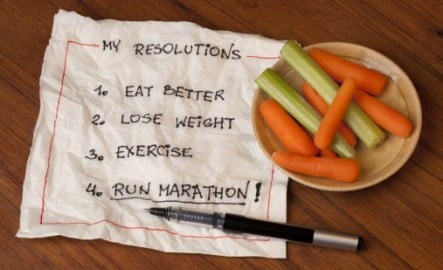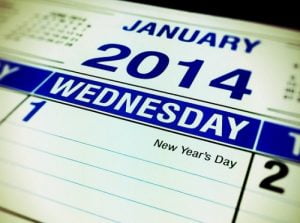
New Year’s Resolutions you will actually stick to
So it’s that time of year again…After the last 4-6 weeks of falling off the bandwagon after Christmas parties, neighbours calling over, catching up with your old friends, office parties and of course Christmas Day, it’s time to start a new plan, write a new To-Do list and start 2014 the way you mean to go on.
At The Edge, we recommend changes and healthy alterations that fit into your lifestyle, resolutions that will stick with you long after January, ones that you can improve as the year progresses so they become habit and part of your life, rather than a faddy gym pass or a diet that you can’t stick to.
The most frequent New Year’s resolutions we come across are the following:
- Lose weight
- Eat Healthy Food
- Start Training (again!)
- Increase Fitness levels
- Increase mood- become happier
- Increase Energy Levels
- Cut down on or cut out Alcohol
- Quit Smoking
The above are a great starting point for your own resolutions, but they need to be realistic. There is no point giving yourself a list that you feel is beyond your ability due to time, money or work/family commitments. You need to think realistically about your lifestyle, your general health and your commitment levels when it comes to change and adaptation.
Most people tend to give up on their resolutions mid- January or February as they lack motivation, support, encouragement or they feel they just can’t do it!
Start simply:
- Cut down on tea and coffee
- Start drinking green tea and drink more water
- Try and have some green leafy salad or veg with each meal
- Limit your intake of sugar and processed foods
- Get out and be active- Join a fitness class like our X-FIT or ask about our Boxing or Buddy Training.
- Find something you enjoy doing, get out and meet new people and put your best foot forward.
- Spend time with your family, not just watching TV, DVD’s or driving them to and from school. Plan trips, organise days out, get active and encourage your friends and family to do the same. You will feel better.
- Stay committed to your goals. Write them on your wall, keep a list in your pocket. Remember- these changes are to make you live a longer, healthier life. They are not about January. They are about making you happier, more energetic and ultimately look and feel fantastic.
If you are interested in speaking to one of our team about starting a new plan for 2014, give us a call now on (01) 853 4091 or email info@theedgegym.ie.
Our team offer support, encouragement and a little push- We will not let you fail. If you are looking to get fit, lose weight, increase lean muscle and feel great, with our help you may be able to finally stick to your New Year’s Resolutions for 2014 and long after….
Make 2014 one to remember.

How to build Muscle. Fast.
Looking to build muscle quickly?
The trick to building muscle is to adequately stress (work) the muscle, then to allow the muscle to recover properly, while eating enough healthy food to feed the new muscle, and….well, repeat!
The best exercises for full body muscle growth are exercises that require you to use multiple joints. For example, a combination of squats, cleans, deadlifts and bench presses is hugely effective at helping you gain lean muscle mass, ie; get bigger 🙂
1. Chose the correct proteins. In order to properly build muscle you need complete or animal-based proteins; these are found in eggs, meat, fish, cheese, milk and most other animal products. The protein found in plant products tends to be incomplete, apart from some potatoes, quinoa and soy beans.
2. Eat enough protein for your weight. You need, roughly, between 1 and 1.5 times your body weight in grams of protein. For example, if you weigh 150 lbs, you should eat between 150 and 225 grams of protein per day if you want to gain muscle.
Proteins that are great for muscle-building include:
Red meat- Beef, pork, lamb, etc.
Fish- Tuna, salmon, seabass, trout, mackerel, etc.
Poultry- Chicken, turkey, duck, etc.
Eggs- Great way to start you day and always include the yolk!
Dairy- Milk, cheese, cottage cheese, yogurt, etc.
Whey- Whey protein shakes.
3. Include low GI carbohydrates in your diet and especially post-workout. Carbohydrates are necessary so that your body can tap into your glycogen (energy) reserves within your muscles while you are working out. If you don’t eat enough carbohydrates, your body will not have energy reserves and will break down your muscles instead! Not what you want if you are looking to get bigger!
Try to opt for low GI carbs, which are healthier and release their energy more slowly- Good examples are:
- Brown Basmati Rice
- Quinoa
- Oats
- Sweet Potato
- Wholemeal Rye Bread
- Wholemeal Spaghetti
4. Don’t skip breakfast. Ever. Breakfast is the most important meal of the day apart from your post-workout meal. Eating a breakfast packed with protein, complex carbohydrates, and fiber will get your metabolism going and your body into fat-burning and muscle-building mode. It will also keep your body from demolishing any muscle for energy.
Start your day with a protein-rich breakfast. Omelets, shakes (or smoothies) and cottage cheese are great sources of protein.
Carbs don’t have the best reputation with the modern day nutritionist but because complex carbs are broken down slowly and are low in sugar, they are acceptable to eat after a workout and, if necessary, at breakfast too, but in small amounts.
5. Eat less food more often. Eat at regular intervals to keep from getting so hungry that you crave the wrong foods when you do eat.
Try eating breakfast, lunch, dinner, post workout, before bed, and two snacks in between. Snacks could include everything from nuts and seeds to sides of veggies or fruit, such as grapes, apples, grapefruit or blueberries.
If you’re trying to gain muscle and lose weight, skip the before-bed meal. Eating right before you go to bed will cause the body to convert any not metabolized food into fat instead of energy or muscle.
6. Take supplements. These are an easy way to gain more protein without having to actually eat it- Whey and soy proteins are the best options. A high protein diet in general can be straining on the kidneys, so it is important to drink a lot of water. This will flush out your system and negate any potential negative effects of consuming a high protein diet.
7. Eat good fats. Not all fats are the same and you should get about 20% to 35% of your overall daily calorie intake from fats.
Eat monounsaturated and polyunsaturated fats. These are the “good” fats, which include:
- Olive, peanut, sunflower, canola, and avocado oils.
- Fish.
- Nuts.
- Flaxseed and pumpkin seeds.
- Soy products such as tofu or soymilk.
Stay away from saturated and trans fats. These are the “bad” fats, which include:
- Ice cream, bars, and pre-packaged snack foods.
- High-fat cuts of meat.
- Lard, margarine, and vegetable fat.
- Fried foods.
8. Drink plenty of water. Dehydration can mean poor muscle recovery, so make sure you drink lots of water throughout the day. Sip on water throughout your workout. Get a water filter to filter your tap water and you will see your water consumption grow.
9. Monitor your salt intake. Although excessive consumption of salt can lead to hypertension, you do lose tremendous amounts of sodium when you sweat. Also, sodium (a key electrolyte) aids in muscle contraction, which is one reason why it is found in many sports drinks.
10. Eat a balanced diet. If you’re not eating what you like, it’ll be much harder to consistently follow your diet.
Here’s a sample diet plan for one day to give you a better idea:
Breakfast: omelet with turkey; whole grain toast; banana.
Pre-lunch snack: mixed nuts; apple.
Lunch: tuna salad with olive oil, onions and capers; sauteed kale.
Pre-workout snack: cottage cheese with blueberries.
Post-workout snack: protein shake; sauteed spinach.
Dinner: grilled chicken breast with sweet potato; stir-fry with peppers, onions, brocolli, and asparagus.
REMEMBER
- Five or more small meals is best as if you eat all your protein in one go, your body won’t be able to use all of it. It’s about maintaining a high blood protein level so that your muscles can slowly regenerate throughout the day and while you are sleeping.
- Remember to include green vegetables in your diet such as spinach or broccoli to ensure that you receive an adequate amount of vitamins. Green leafy vegetables are high in fiber which is essential for removing waste from your body.
- Balance your workouts. If you are doing a highly aerobic activity of any kind and don’t eat a high protein diet, you will consistently lose strength and muscle mass.
- Creatine supplements are often used by weight lifters and bodybuilders. Creatine is a natural substance that helps increase pure muscle mass and helps regenerate muscles when not working out. However, it is merely a supplement, and is not necessary to gain muscle mass. If you do take the creatine, be sure to drink plenty of water, because the creatine dehydrates your muscles while regenerating and also imbalances your electrolyte levels.


